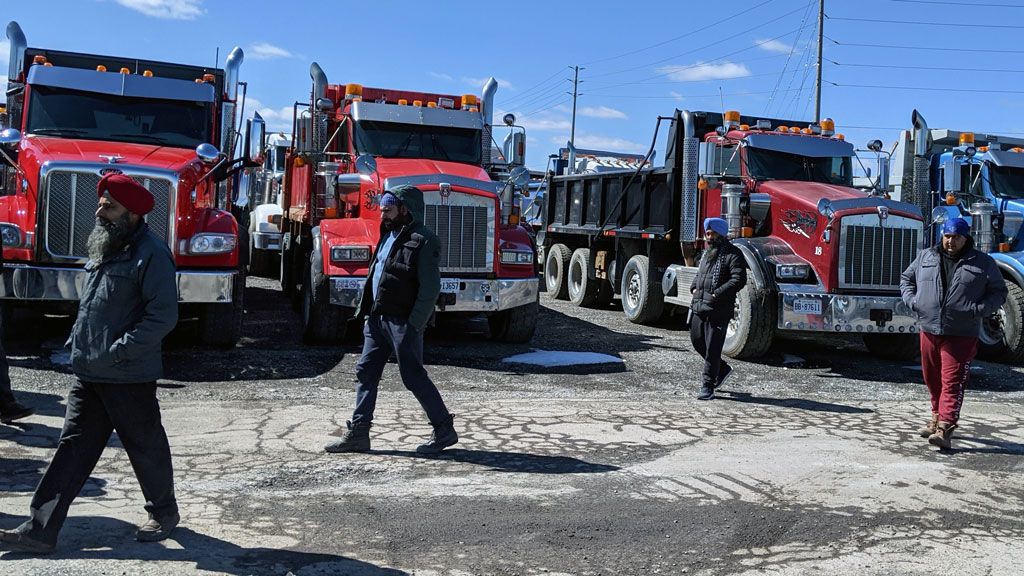Dump truck owner-operators in the GTA represented by the Ontario Dump Truck Association (ODTA) are continuing a third week of job interruption with a wide gulf apparently remaining between the truckers and their partners in the earth moving sector.
David Rumble, head of the Associated Earth Movers of Ontario (AEMO), whose members are the primary buyers of the services of the 1,500 members of the ODTA, said many worksites have been disrupted but so far no projects have come to a standstill.
Dump truck operators deal with contractors through brokers and primarily remove fill and other materials from excavations.
“Most of our members have been disrupted,” said Rumble. “If they don’t have enough trucks, they’ll be working with sharing trucks and getting their work done. It hasn’t stopped the industry. They’re working at a slower pace.”
The job action started March 21 with members of the ODTA citing spiking fuel costs, other rising costs and poor working conditions as reasons for the stoppage.
Rates were last raised six years ago and the dump truck drivers want a new deal with 20 to 25 per cent raises.
The sides are not far apart on monetary issues but the impasse stems from a more fundamental issue – the legal ability of the ODTA to sign a collective agreement. ODTA adviser Bob Punia and others have drawn up a nine-page document with working conditions they insist represent the minimal terms under which ODTA members will work.
When representatives of the AEMO and the ODTA got together on March 22, Rumble said, his team entered the meeting unaware the ODTA was not a “recognized association,” certified to undertake negotiations on behalf of its members under the Labour Relations Act.
“The ODTA confirmed, during the meeting, that they did not have a constitution, nor do they have a members list,” said Rumble.
As for the ODTA contract, Rumble said, “It can’t be signed…we cannot sign it on behalf of our members.
“If you ask them for their constituency, and the people who are signed up in their membership, they can’t provide it.”
Punia noted the AEMO negotiates with other entities such as the Teamsters Union and rejects the argument the Earth Movers cannot sign a deal with the ODTA.
“We are a recognized, established and respected association with authority to represent our members,” he said. “We expect industry partners to enter into a collective agreement or a signed framework with us that will lay out basic rights and obligations.”
Patrick Groom, labour law specialist with McMillan, explained the ODTA is not an association recognized by the Ontario Labour Relations Board (OLRB) with the authority to sign collective agreements.
He outlined three possible options for solving the accreditation impasse.
The ODTA could become recognized as a trade union, with its members having the status of dependent contractors with similar rights to employees under the Labour Relations Act; members of the ODTA could join a trade union such as the Teamsters; or the parties could negotiate in a freedom of contract environment, with the AEMO signing contracts with the dump truck operators.
In the third scenario, the agreement would not be a collective agreement protected by the Labour Relations Act so it would be difficult to enforce.
“They absolutely could agree to minimum terms for the industry,” Groom said, but members of the AEMO would be faced with policing the agreement to convince AEMO members not to sign deals with brokers offering discounted rates, as a step towards labour stability.
Rumble sent a letter to Punia offering to raise the rates 20 per cent but admitted it was “very, very challenging” to get his members to agree to that rate.
As for the other terms in the proposed contract, a number are “strong” and unacceptable to his members. But Rumble said he told the ODTA, “We can’t sign a contract with you but what we can do is we can work with you for the betterment of the industry.”
Punia said the association will be recognized by the Ontario Labour Relations Board “in the coming days.”
The ODTA’s bottom line, he said, is signatures on the contract.
“They should, in good faith, come to the table, recognize us and make an agreement with us because regardless of what happens, our trucks aren’t moving until we have the agreement,” he said of the AEMO.
“All we’re saying is that we would like the respect and dignity that you’re giving to other groups.”
Follow the author on Twitter @DonWall_DCN.










Recent Comments
comments for this post are closed